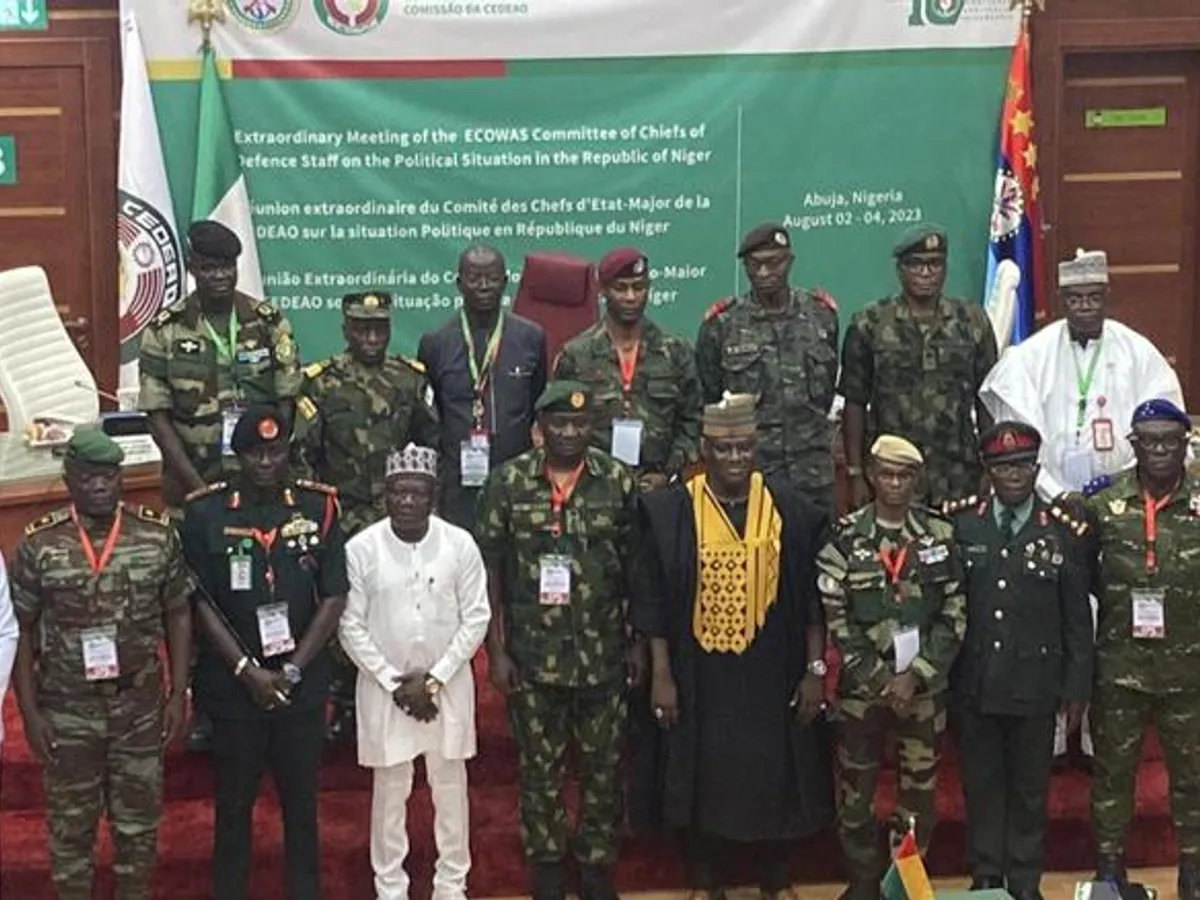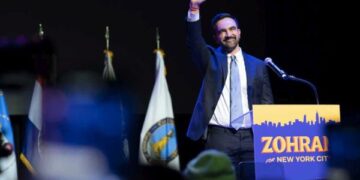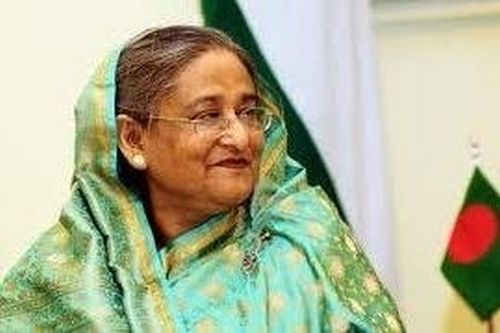Niamey (Niger): Defence chiefs from West African nations finalised an intervention plan on Friday and urged militaries to ready resources after negotiations deadlocked with Niger’s military junta, which says it is severing military agreements with France, its former colonial ruler.
With two days remaining before a deadline set by the regional bloc to release and reinstate President Mohamed Bazoum or face possible force, the junta announced that it was firing some of the previous government’s key ambassadors and warning citizens of the West African nation to watch for foreign armies and spies. In a plea published in a Washington Post opinion piece, Bazoum said, “I write this as a hostage” and urged the US and partners to help.
The junta’s announcement late on Thursday deepens the post-coup isolation for what had been the United States’ and allies’ last major security partner in the Sahel, the vast region south of the Sahara desert that Islamic extremist groups have turned into the global centre of terrorism.
Niger’s soldiers, who staged a mutiny on July 26, face a Sunday deadline set by the regional bloc known as ECOWAS, whose envoys arrived on Thursday for talks. But those discussions stalled, with the delegation unable to meet the coup leader, General Abdourahmane Tchiani, or go into the capital, Niamey, according to a person with close knowledge of the talks who spoke on condition of anonymity because they were not authorised to comment.
However, defence chiefs from ECOWAS countries, excluding Mali, Burkina Faso, Chad, Guinea and Niger, met on Friday in Abuja, Nigeria, concluding with several measures, including a military intervention outlined as recommendations to the regional leaders.
“All the elements that would go into any eventual intervention have been brought out here and been refined, including the timing, the resources needed and the how and where and when we are going to deploy such a force,” said Abdel-Fatau Musah, ECOWAS commissioner for political affairs, peace and security.
Musah did not say whether ECOWAS would deploy such a force at the end of the one-week deadline given to the junta, but added that the junta should reinstate Bazoum as president in the coming days or “we will make them hand over to the civilian authorities”.
Nigerian chief of defence staff asked the regional military chiefs to follow “a sense of urgency” and allocate the necessary resources as they had agreed.
“ECOWAS will not be used for coups. Democracy is what we stand for and democracy is what we will sustain,” said Christopher Musa, the Nigerian defence chief. He called for action to also address security lapses in West Africa, saying the latest mutiny highlights “the fragility of our region”.
The junta’s announcement brought further scepticism about any deal. It said it was terminating the military agreements and protocols signed with France and announced the end of functions for Niger’s ambassadors to France, the United States, Togo and neighbouring Nigeria, which is leading ECOWAS efforts on dialogue.
“All aggression or attempt at aggression against the state of Niger will see an immediate response and without warning,” said a spokesman for the coup leaders, Colonel Major Amadou Abdramane, with the exception of Mali, Burkina Faso and Guinea, which have expressed support for the coup. Mali and Burkina Faso have said such an intervention would be a declaration of war against them.
France’s Foreign Ministry responded that Paris only recognises “the legitimate Nigerien authorities”, dismissing the move by coup leaders. France reiterated its call for “the re-establishment of the democratic institutions of Niger”, the ministry said.
Bazoum wrote that Niger’s security situation had been improving before the coup, in contrast to neighbouring Mali and Burkina Faso that are led by military juntas, but said that is now at risk because Niger would lose aid from foreign partners and extremist groups would take advantage of the country’s instability.
“In our hour of need, I call on the US government and the entire international community to help us restore our constitutional order,” he wrote.
France has 1,500 military personnel in Niger, which had been envisioned as the base for counter-terror operations in the region after anti-French sentiments grew elsewhere.
The US has 1,100 military personnel in Niger, including at a key drone base, and indicates its reluctant to leave, especially with the growing influence of the Russian private military group Wagner in the Sahel.
Kremlin spokesman Dmitry Peskov told reporters it was concerned about emerging regional tensions but the “interference by non-regional powers is unlikely to change the situation for the better”.
ECOWAS has been unsuccessful in stemming coups and is trying to change course with Niger in a region that has seen five of them in the past three years — two each in Mali and Burkina Faso.
Nigeria’s President Bola Tinubu, fulfilling a legal requirement, informed lawmakers on Friday of the ECOWAS intention to intervene militarily in Niger if the coup leaders “remain recalcitrant”.
But there are risks that any intervention could get Bazoum killed, said James Barnett, a researcher specialising in West Africa at the Hudson Institute.
“You would have to have a very surgical rescue operation to ensure that does not happen,” he said.
Another concern is that the junta might arm civilian militias to resist any intervention.
“I fear the junta would gladly use its own people as cannon fodder or human shields, and ECOWAS militaries do not have a good record when it comes to avoiding collateral damage,” Barnett said.
Many people in Niamey did not appear concerned that ECOWAS will use force, while others wondered why the regional bloc has not had the same resolve to tackle extremist violence.
“If ECOWAS has an army, it could mobilise 1,000 soldiers per country … 15,000 soldiers. If ECOWAS was serious, why didn’t it consider mobilising 15,000 soldiers to help Mali, Burkina and Niger, which are undergoing insecurity?” said Annassa Djibrilla, president of the Dynamic Citizen activist group.
Niger’s roughly 25 million (2.5 crore) people live in one of the poorest countries in the world, and any cuts in foreign aid could be disastrous. Already, citizens are feeling the effects after ECOWAS suspended all commercial and financial transactions between its member states and Niger and froze Nigerien assets held in regional central banks.
The bloc’s sanctions include halting energy transactions with Niger, which gets up to 90 per cent of its power from Nigeria, according to the International Renewable Energy Agency. Earlier this week, power transmission from Nigeria to Niger was cut off, an official at one of Nigeria’s main electricity companies said, speaking on condition of anonymity because they were not authorised to comment.
The People’s Coalition for the Sahel, an informal alliance of several dozen Sahelian and West African civil society organisations, expressed concern for the military takeover and called for the protection of civilian populations to be a priority for all parties.
“Nigerien civil and political liberties must be preserved and safeguarded, including protecting the rights of civil society organisations and human rights defenders to continue their activities freely and safely,” the group said in a statement.






